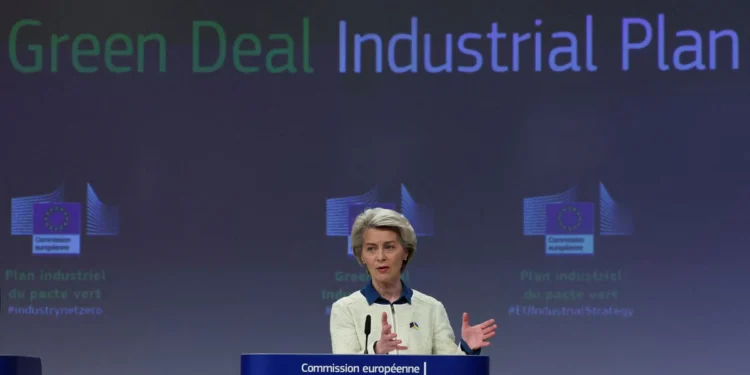To aid in the rapid transition to climate neutrality and increase the competitiveness of Europe’s net-zero industry, the Commission has today unveiled the Green Deal Industrial Plan. The Plan aims to make it easier for European Union member states to increase the production of zero-emission technologies and goods.
The Plan leverages the advantages of the EU Single Market and expands upon initiatives already in motion, such as the European Green Deal and REPowerEU. It rests on four principles: a streamlined and predictable regulatory framework; increased access to capital; improved human capital; and free trade to foster robust supply chains.
The Plan’s first pillar centres on streamlining the existing regulatory structure.
To establish targets for net-zero industrial capacity and a regulatory framework suitable for its rapid deployment, the Commission will propose a Net-Zero Industry Act. This act will ensure simplified and fast-track permitting, promote European strategic projects, and develop standards to support the scale-up of technologies across the Single Market.
The reform of the electricity market design will help consumers take advantage of the lower costs of renewables, and the Critical Raw Materials Act will guarantee adequate access to materials like rare earth essential for manufacturing key technologies.
The Plan’s second pillar is boosting institutional support for European clean technology manufacturing. The massive amounts of private financing needed for the green transition can be unlocked by combining public funding and continued progress on the European Capital Markets Union. Furthermore, by streamlining the process by which Member States can provide aid to expedite the green transition, the Commission’s competition policy seeks to ensure a level playing field within the Single Market. Therefore, the Commission will consult the Member States on an amended Temporary State aid Crisis and Transition Framework and will revise the General Block Exemption Regulation in light of the Green Deal, increasing notification thresholds for support for green investments, all to speed up and simplify the aid granting process. This will help streamline and simplify the approval process for IPCEI-related projects, among other things.
The Commission will also make it easier for the European Union’s existing funds to support clean technology development, production, and implementation. Based on an ongoing investment needs assessment, the Commission is also looking into ways to get more EU-wide funding to back manufacturing investments in zero-emissions technologies. The Commission and the Member States will collaborate on a short-term bridging solution to provide quick and targeted support through REPowerEU, InvestEU, and the Innovation Fund. In addition, the Commission plans to propose a European Sovereignty Fund as part of the review of the Multiannual Financial Framework by the summer of 2023, providing a structural answer to the investment needs over the medium term.
The Commission has adopted new guidance on recovery and resilience plans, outlining the process of modifying existing plans and the modalities for preparing REPowerEU chapters to facilitate Member States’ access to the REPowerEU funds.
Since the green transition could affect 35–40% of all jobs, the European Year of Skills will prioritise training people for high-paying jobs (the third pillar of the Plan).
The Commission will propose setting up Net-Zero Industry Academies to roll out up-skilling and re-skilling programmes in strategic industries to prepare for a people-centred green transition. Measures to foster and align public and private funding for skills development, as well as how to facilitate access of third-country nationals to EU labour markets in priority sectors, will also be taken into account.
Building on engagements with the EU’s partners and the work of the World Trade Organization, the fourth pillar will be global cooperation and doing trade work for the green transition under the principles of fair competition and open trade. Towards this end, the Commission will expand the European Union’s (EU) network of Free Trade Agreements and other forms of cooperation with partners to support the green transition. Furthermore, to ensure global security of supply through a competitive and diversified industrial base, the report will also examine the feasibility of forming Clean Technology/Net-Zero Industrial Partnerships and a Critical Raw Materials Club to bring together raw material “consumers” and resource-rich countries.
The Commission will also use its instruments to prevent foreign subsidies from distorting competition in the Single Market, particularly in the clean technology sector.
“We have a once in a generation opportunity to show the way with speed, ambition and a sense of purpose to secure the EU’s industrial lead in the fast-growing net-zero technology sector. Europe is determined to lead the clean tech revolution. For our companies and people, it means turning skills into quality jobs and innovation into mass production, thanks to a simpler and faster framework. Better access to finance will allow our key clean tech industries to scale up quickly.”
Ursula von der Leyen, President of the European Commission






